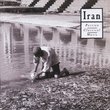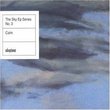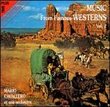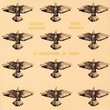| All Artists: George Frederick Handel, Masaaki Suzuki, Bach Collegium Japan Orchestra, Midori Suzuki, John Elwes Title: Handel: Messiah Members Wishing: 1 Total Copies: 0 Label: Bis Release Date: 2/18/1997 Album Type: Import Genres: Special Interest, Classical Styles: Holiday & Wedding, Opera & Classical Vocal, Historical Periods, Baroque (c.1600-1750) Number of Discs: 2 SwapaCD Credits: 2 UPCs: 789368610525, 7318598918922 |
Search - George Frederick Handel, Masaaki Suzuki, Bach Collegium Japan Orchestra :: Handel: Messiah
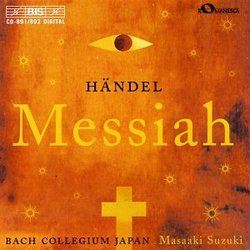 | George Frederick Handel, Masaaki Suzuki, Bach Collegium Japan Orchestra Handel: Messiah Genres: Special Interest, Classical
The Bach Collegium Japan has proved itself in Bach cantatas, but Messiah is as sacred a musical cow as Anglo-Saxons have. Don't be skeptical, though: these Japanese musicians are the equal of any anglophone group. In fact,... more » |
Larger Image |
CD DetailsSynopsis
Amazon.com The Bach Collegium Japan has proved itself in Bach cantatas, but Messiah is as sacred a musical cow as Anglo-Saxons have. Don't be skeptical, though: these Japanese musicians are the equal of any anglophone group. In fact, this performance's only serious weakness is its English soloists: tenor John Elwes and bass David Thomas are admirable artists who have seen better days. The Japanese soloists fare better: Midori Suzuki has an agile, youthful (sometimes fragile) soprano; countertenor Yoshikazu Mera's excellent coloratura and eloquent delivery compensate for any lack of vocal heft. Masaaki Suzuki's choir and orchestra perform with clarity, warmth, excellent English diction, and a sense of wonder not heard since Hogwood's 1980 recording. Messiah-manes may want to program their CD players to mix Suzuki's chorus with, say, Hogwood's or Christie's soloists. --Matthew Westphal Similar CDs
|
CD ReviewsNot the best, but quite good Michael K. Halloran | 01/10/2001 (4 out of 5 stars) "Perhaps no task is as daunting to the classical music novice as choosing a recording of Handel's "Messiah." It is a given that no one recording will satisfy all points equally well, although some come close. Suzuki's recording with the Bach Collegium Japan will probably not be any listener's first choice, but there are enough good things here to recommend this set.The recording is a period performance, and one on a smaller-scale than most: 21 choristers, 20 orchestral players. It is a credit to Suzuki and his ensemble that the music nevers sounds thin or emaciated -- rather, there is a beautiful, delicate, other-worldly transparency that results. This is one of the rare recordings that really makes "Messiah" a spiritual experience rather than an excuse to cash in on the familiarity of the music.The choir sings beautifully, always clean and with really jaw-droppingly accurate runs. Listen to the "we have turned" melismas in "All we like sheep" and you'll know what I mean. The orchestra is equally fine; they can produce a full dramatic sound when necessary, but clarity and taste are always present.The soloists are a mixed bag. I'm disappointed in the men -- John Elwes has some truly bizarre pronunciation issues and it feels like he's attacking the text rather than enunciating it. David Thomas sounds worn and dry, and his coloratura is approximate, with some notes only guessed at.However, the higher-voiced soloists are from another plane entirely -- they sound angelic, unearthly. Both have soft-grained voices with just enough vibrato to add interest. Neither would be my first choice to hear in this music, but they fit Suzuki's concept of the score brilliantly. Each has coloratura that rises naturally out of the line and becomes part of the line itself, rather than just an excuse for technical display -- I've never heard these passages sung like this in any other "Messiah" recording. It reminds the listener that coloratura was a normal part of Baroque vocal expression and should be treated as such. Tasteful vocal ornamentation is allowed, as well, which I like. The pronunciation of Mr. Mera and Ms. Suzuki is also excellent -- an occasional odd vowel sound aside, you'd never guess that these weren't native English speakers.This is a recording that reminds us how special this music is and how easy (and dangerous) it can be to become accustomed to bland, mechanical performances of this masterpiece. The tenor and bass soloists aside, this is a fine recording -- not a first choice, perhaps, but one recommended to augment a personal favorite." Excellent all around! Gregory M. Zinkl | Chicago, IL | 12/22/2000 (5 out of 5 stars) "This is a beautiful performance of a warhorse.Suzuki and his colleagues give us a very polished and refined performance. While in some hands, polish and refinement can translate into a surface gloss, what we have here is a performance that digs into the meaning of the text, and yet further, seems to almost *preach* the text (in the most positive meaning)--it seems to be heartfelt.While the Amazon reviewer complains that the male soloists might be past their prime, I find nothing 2nd rate about them--so maybe in comparison to themselves they come up short, but certainly not in general! The orchestra is small--the same size as Radu's on Vox--but the playing is world-class instead of provincial, and the acoustic (the same locale as their on-going Bach cantata series) is perfect, as is the engineering. The overall effect is that any scrawniness that small ensembles such as this one can bring is either masked by the helpful acoustic, or these musicians are so accurate, scrawniness doesn't happen! (I'm betting the latter, btw).The chorus is well-balanced, and although the diction isn't as marvelous as Radu's, it's pretty darn good, and this Japanese group gives their English-speaking colleagues a good run for their money!So, another take on the Messiah that is worthy to add to an already over-crowded catalogue!" Overall the best Messiah I have heard so far (out of many) cdwitmer | Tachikawa, Tokyo Japan | 07/31/2002 (5 out of 5 stars) "We're a "Messiah-singing family" and various versions of Handel's Messiah, including CDs and scores, are heavily used around our house. This is the recording we always come back to as our main reference standard. I haven't heard every single recording that gets good reviews, but I have heard a good half dozen of the most popular recent recordings as well as the standard recordings from the 1970s and 1960s, and this recording tops them all. It isn't a perfect recording by any means, however. For example, BCJ could easily top this recording today by using Robin Blaze in place of Yoshikazu Mera. It never ceases to amaze me that as of this writing Mr. Blaze still doesn't appear in a released recording of Messiah, despite having participated in more than 70 recordings of Renaissance and Baroque choral works to date. A few years ago I heard Mr. Blaze as the Alto soloist with Harry Christophers and The Sixteen, and boy did the sparks fly on Mr. Blaze's solos. Truly wonderful, like nothing I have heard from any Alto soloist previously. BCJ uses Mr. Blaze as a soloist extensively, but director Masaaki Suzuki has told me he has no plans to re-record this work even for release on DVD (which is how BCJ got its recording of Mr. Blaze singing in Bach's Johannes-Passion; Mr. Mera appears on the earlier CD issue). I consider Mr. Mera to be the weak link in this Messiah recording. It's interesting to me that other some reviewers raved about him, because his singing does not impress me all that much -- too lacking in heft. Having said that, I *still* prefer Mr. Mera to many female voices that I have heard singing the Alto solos. The Amazon reviewer was not thrilled with Mssrs. Elwes and Thomas but I have no complaints. Have their voices seen better days? Yes, it must be admitted. But they delivered wonderful performances nevertheless. And contrary to what one reviewer said, Mr. Elwes does *not* have "some truly bizarre pronunciation issues." Among the soloists, it is Soprano Midori Suzuki (wife of cellist Hidemi Suzuki) who really shines. I can see where someone might characterize her voice as "sometimes fragile"; however, I don't know if I would go that far. I think her renditions of the Soprano arias are the best I have ever heard. If I had to subtract any points from her performance, perhaps it might be in her recitatives; for those I tend to prefer The Sixteen's soloist Lynda Russell. As for the chorus, well, I don't think anybody can touch them, even The Sixteen or other top choirs. Even here I don't want to give a perfect score; there are places where I think some nuances of Handel's meaning have not been adequately brought out through the choir's singing technique, but I think that is because of an interpretative decision on Masaaki Suzuki's part, rather than because the chorus couldn't deliver. This is a chorus that delivers exactly what is asked of it. The same is true of the instrumental performers. So, to reiterate: definitely not perfect, but certainly one of the best if not the absolute best Messiah to date, and worth all five of the stars I gave it."
|

 Track Listings (25) - Disc #1
Track Listings (25) - Disc #1